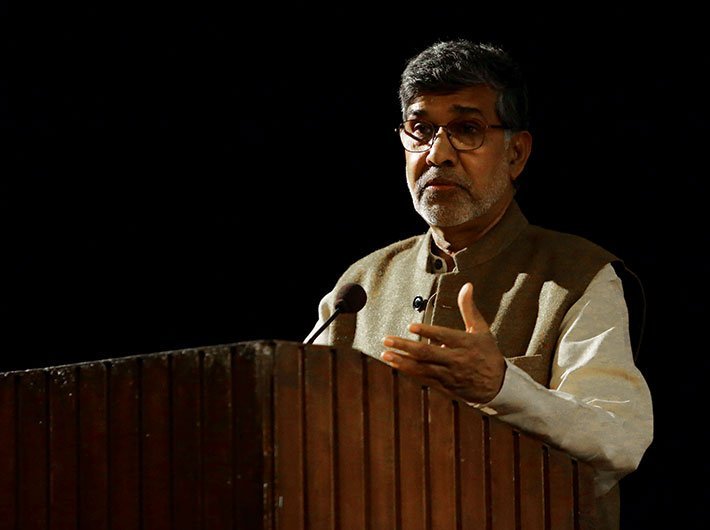Raise concerns of public health crisis and economic impact on marginalised communities that will trap girls and boys in child labour
Eighty-eight Nobel laureates and world leaders have come together as part of ‘Laureates and Leaders for Children’ and called for the global attention towards children during Covid-19 lockdowns and its aftermath.
The Dalai Lama, Archbishop Desmond Tutu, Prince Ali Al Hussein, Leymah Gbowee, Kerry Kennedy, Rigoberta Menchu Tum, Jose Ramos-Horta, Mary Robinson Guy Ryder and Kailash Satyarthi among others have issued a statement, appealing to the heads of government around the world to demonstrate wise leadership and urgently care for the impoverished and the marginalised.
“We, the Laureates and Leaders for Children, call upon the world’s heads of government to demonstrate wise leadership and to urgently care for the impoverished and the marginalised. Decisions made by our leaders, actions taken by us and the discourses that ensue in the next few weeks will be crucial. They are going to shape the future of polity, economy, culture and morality. Development priorities will be recalibrated, individual freedom, privacy and human rights will be redefined. We must take this opportunity to transform traditional diplomacy and politics into compassionate politics,” says the statement.
Covid-19 has exposed and exacerbated pre-existing inequalities in our world, they say. While this virus does not differentiate between nationalities, religions or cultures it is most adversely impacting those who are already marginalised; the poor, women and girls, daily wage earners, migrant labourers, indigenous peoples, victims of trafficking and slavery, child labourers, people on the move (refugees, internally displaced and others) the homeless and differently abled people, among others.
“The pandemic’s public health emergency is set to exacerbate the abuse and exploitation of children. Trapped in homes to escape the virus, children are at greater risk of sexual abuse (offline and online) and domestic violence. Online child pornography is already growing while traffickers are planning to exploit families once lockdowns are lifted,” said Kerry Kennedy.
Beyond the impact of the public health crisis on marginalised communities the economic impact is likely to trap more girls and boys in child labour. As restrictions are lifted in countries children will be trafficked, forced out of school and into labour, bearing the burden of sustaining their families. With more than 90% of the world’s student population out of school due to school closures (as of 22 April), child marriage rates are also anticipated to increase.
“Over the last several weeks policy makers released more than US$5 trillion in emergency support for the companies and people in the richest countries. That funding is needed and is important but we also need to see the governments of the world come together and announce a rescue package for the most marginalised children. If for once our world gave the most marginalised children and their families their fair share i.e.; 20% of the Covid-19 response for the poorest 20% of humanity the results would be transformative” said Prince Ali Al Hussein.
“One trillion dollars would fund all outstanding UN and charity Covid-19 appeals, cancel two years of all debt repayments from low-income countries and fund two years of the global gap to meet the SDGs on health, water, sanitation and education, a vital step as quality education is the most powerful way to end exclusion and change the future for marginalised children. There would still be enough left to fund social protection safety nets which are crucial in the fight against child labour. More than ten million lives would be saved; a positive response by humanity to the tragedy of Covid-19,” said Kailash Satyarthi, founder, Laureates and Leaders for Children.
“We urge that the necessary resources be made available through national governments and international and two regional financial institutions. We anticipate that the numbers of the most marginalised will grow. We must prevent the fallout of Covid-19 being borne by the world’s children. Poverty and hunger, child labour, child marriages, child slavery, child trafficking and children on the move will likely increase during and after Covid-19. We need to ensure that the most marginalised do not fall off the world's radar. Post-Covid-19, we must strengthen institutional responses to such future catastrophes and improve the existing child protection infrastructure, cash transfers and ensure food security for the marginalised, improve hygiene and sanitation, provide a robust healthcare system, and promote a free and equitable education system with free school meals which will be critical,” says the statement.
“While we acknowledge initial measures taken by the G20, as Laureates and Leaders for Children, fighting for the most vulnerable children in the world's poorest countries we call on leaders of the G20 to take additional action beyond their own borders for those who urgently need coordinated international aid. We also call on all G20 leaders to honour existing global health commitments, including quickly working together and with stakeholders to close the financing gap in the WHO Strategic Preparedness and Response Plan. The WHO has played a vital role in supporting basic healthcare in less developed regions of the world. Regional institutions such as the Organization of American States, the South Asian Association for Regional Cooperation, the Economic Community of West African States, the Arab League and others must also step up in this space,” says the joint statement.
Currently, nearly one in every five children worldwide lives on under $2 a day. The World Bank announced on April 20 that it estimates Covid-19 will push 40 to 60 million people into extreme poverty in 2020. The International Labour Organization (ILO) has reported that tens of millions of informal workers have already become unemployed with widespread problems with the food supply in poorer communities across the world.
“Governments need to do more to prevent devastating nutrition and health consequence for the 370 million children missing out on school meals amid school closures. These compounding factors mean that marginalised children are already going hungry and could starve” it says.

